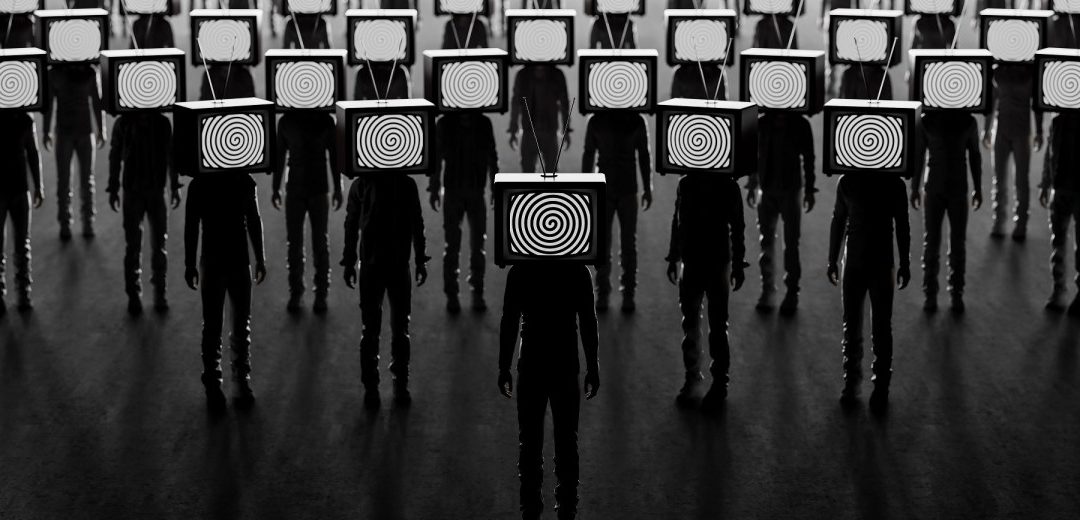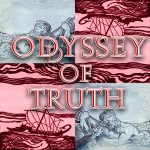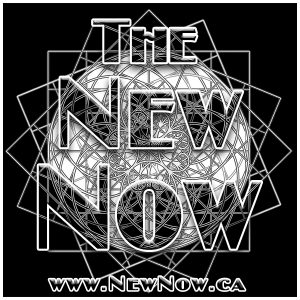Is the Mainstream Media a Threat to Freedom and Sanity?
The following is a transcript of the video found at the end.
“I rejoice that horses and steers have to be broken before they can be made the slaves of men, and that men themselves have some wild oats still left to sow before they become submissive members of society.”
Henry David Thoreau, Walking
If this claim of Henry David Thoreau’s is true – that we must be broken before we become enslaved and submissive – then we are a broken population. For most of us are submissive to a fault. We do what we are told no matter how absurd, idiotic, or immoral, so long as the command comes from a politician, bureaucrat, or scientist. In exchange for protection from relatively trivial threats we have given away our freedom and are permitting the rise of a truly deadly threat – totalitarianism. But can the tides be turned? In this video we are going to make the case that the internet, smartphones, and social media are technologies that may prove very unfavourable to those who wish to place us in the chains of a technocratic totalitarianism.
It is said that politics is downstream from culture – that culture, in other words, determines the type of rule that emerges in a society. But one could also say that culture is downstream from technology. Technological innovations, by creating new possibilities for how we interact with the world, change culture. Of all the technological revolutions that engender cultural change, changes in communication technologies are among the most impactful. For these technologies sculpt the flow of information and information is power. Information directs our focus and so helps shape our perception of reality. Information demonstrates what is possible and so influences how we act. And in the political realm information legitimizes or delegitimizes a ruling class structure. Change the communication technology and you change the flow of information. Change the flow of information and you change a culture. Change a culture and you change the political status quo.
A cursory glance at two communication technology revolutions that preceded the rise of the internet – the invention of Gutenberg’s moveable-type printing press in the mid-15th century and the rise of the mass media of radio and television in the 20th century – reveals the dramatic social change that comes in their wake.
“Socially, the typographic extension of man brought in nationalism, industrialism, mass markets, and universal literacy and education.”
Marshall McLuhan, Understanding Media
The printing press led to an explosion in the publishing of books. It is estimated that only 12,000 books were copied by all the scribes in Europe in the 50 years prior to this invention while in the 50 years following it approximately 12 million books were produced. By reducing the cost of publishing a book, information flowed into more houses and ideas expanded the minds of a greater number of people and with profound political implications. The increase in the number of bibles was an important factor in the Reformation and the pamphlet movement was a driving force of the French and American Revolutions.
“As a result of Gutenberg’s invention monarchs were beheaded, world maps were redrawn. . .Modern society and modern economics were born.”
Andrey Miroshnichenko, Human as Media
The next major communication revolution was the invention of the electric telegraph and the radio, telephone and television which followed soon after. These technologies diminished the need for a transportation network of rail, road, and sea to spread information and so shrunk the globe. The ability to beam information into every home in a nation simultaneously, gave rise to the paradigm of the mass media that defined the 20th century. In 1947, The Commission of Freedom of the Press gave a prescient description of the power unleashed by the informational flows of this new media paradigm:
“The modern press itself is a new phenomenon. Its typical unit is the great agency of mass communication. Those agencies facilitate thought and discussion. They can stifle it. They can advance the progress of civilization or they can thwart it. They can debase and vulgarize mankind. They can endanger the peace of the world . . . They can play up or down the news and its significance, foster and feed emotions, create complacent fictions and blind spots, misuse the great words, and uphold empty slogans.
A Free and Responsible Press by The Commission on Freedom of the Press, 1947
The mass media of radio and television structures a top-down informational flow. The relative few who own and operate the broadcasting infrastructure in cooperation with the wealthy and powerful individuals, corporations, and institutions who influence the institutions of mass media, filter, manipulate and package the content in ways that serve their interests.
“The [mass] media proclaim themselves a supplier, but it really serves as a valve, which opens for money or when given permission to by the authorities.”
Andrey Miroshnichenko, Human as Media
Mass media made possible a never-before-seen conformity in worldviews and proved an excellent paradigm for the furtherance of ideologies that favoured top-down, centralized control. For those who determine what information flows through the mass media have the power to direct the attention of the masses toward certain issues and events, and away from others or as Michael Parenti explains:
“If the press cannot mold our every opinion, it can frame the perceptual reality around which our opinions take shape. Here may lie the most important effect of the news media: they set the issue agenda for the rest of us, choosing what to emphasize and what to ignore or suppress, in effect, organizing much of our political world for us. The media may not always be able to tell us what to think, but they are strikingly successful in telling us what to think about.”
Michael Parent, Inventing Reality: The Politics of Mass Media
In a more cynical manner, one could say that mass media grants the few who control it the sort of power depicted in George Orwell’s novel 1984:
“Power is in tearing human minds to pieces and putting them together again in new shapes of your own choosing.”
George Orwell, 1984
The Nazis made use of the mass media to induce their population into accepting totalitarian rule, for as the Nazi propaganda minister Joseph Goebbels stated: “Our way of taking power and using it would have been inconceivable without the radio…” Gordon Allport and Hadley Cantril, in their 1935 book The Psychology of Radio, echoed the sentiment behind Goebbels claim writing:
“Radio is an altogether novel medium of communication, preeminent as a means of social control and epochal in its influence upon the mental horizons of men.”
Gordon Allport and Hadley Cantril, The Psychology of Radio
A unidirectional, limited, and filtered flow of information, all in the control of a select few and served up to the gullible masses creates a situation analogous to Plato’s allegory of the cave. In this allegory prisoners are chained in a cave and forced to watch the dancing of shadows on walls. Not knowing any better, the prisoners mistake the shadows for reality and as Richard Weaver writes in Ideas Have Consequences:
“. . .the [mass media] is a translation into actuality of Plato’s celebrated figure of the cave. The defect of the prisoners. . .is that they cannot perceive the truth. The wall before them, on which the shadows play, is the screen on which press, motion picture, and radio project their account of life.”
Richard Weaver, Ideas Have Consequences
And herein lies the power of the internet revolution – it is a means for the masses to escape from the cave of manipulated shadows. For each time one of us identifies corruption by institutional authorities, sees through a lie, or identifies an act of propaganda – once we notice in other words, that what is thought to be a truth is but the manipulation of a shadow – we can reveal our discovery to an audience of potentially millions. The internet revolution is ending the monopoly the mass media has on the flow of information and so if the printing press led to an emancipation of readership, then as Miroshnichenko writes:
“What we are experiencing now is . . .the emancipation of authorship. Personal computers as well as mobile devices. . .have given all individuals the unlimited right to share their thoughts with others, whatever their reason. . .”
Andrey Miroshnichenko, Human as Media
Will the emancipation of authorship be as transformative as the communication revolutions that preceded it? Time will tell but, to quote Miroshnichenko once again:
“. . .if historical analogies are accurate, then we should . . . expect comparable cataclysms [following the rise of the internet]. The powers of the old authorities. . .have always collapsed along with their loss of sacral control over information. As a result, the social, political and economic status quo falls apart. With every release of content, society sheds its old form, like a snake sheds its skin.” (Human as Media)
Andrey Miroshnichenko, Human as Media
The informational flows made possible by the internet should not be viewed as solely destructive and delegitimizing in their effects. Rather, in a more constructive manner they are revealing alternative possibilities for how society can operate and how individuals can live their lives. Be it alternatives to the inflationary monetary system of fiat currency, to the government control of education and healthcare or to the political structure of society at large, ideas that would never have been permitted in the controlled paradigm of the mass media are being spread by the emancipation of authorship. This new media paradigm is unleashing the creative destruction needed to keep society from descending into the rot of stagnation.
But as this free flow of information is threatening to the parasitic lifestyle of many who occupy positions of power, we should expect increased calls for censorship in the attempt to force us back into the cave of deceptions. This censorship will be justified as needed to limit hate speech and to correct misinformation – but these excuses are merely the attractive packaging being used to hide what is a socially destructive act – the stifling of free speech in the attempt to protect powerful interests. The emancipation of authorship threatens the legitimacy of the oligarchical class of politicians, bureaucrats and crony capitalists and their ability to pull off their machinations behind the protective veil of the manipulated mass media.
“The gods and men who have kept their prestige for long have never tolerated discussion. For the crowd to admire, it must be kept at a distance.”
Gustave Le Bon, The Crowd: A Study of the Popular Mind
This is not the first time attempts have been made to limit the informational flows that emerge from new communication technologies. Following the invention of the printing press the ruling class of Europe implemented harsh censorship laws. One example was the English Licensing Order of 1643 which mandated the arrest of anyone who printed books critical of the government. But the power of the printing press proved too strong, its effects could not be contained by mandates of a ruling class grasping for power and as Marshall Mcluhan wrote:
“Once a new technology comes into a [society] it cannot cease to permeate that [society] until every institution is saturated.”
Marshall McLuhan, Understanding Media
But history merely rhymes, it does not repeat. And it is possible that if we are too passive and do not take a hard stance against attempts to stifle free speech, then this technological revolution will be one that differs from those of the past. Those in power will learn to use this new technological paradigm to their advantage and instead of liberating us, these technologies will be the tool that descends us into the hell of a technocratic global totalitarianism.
“Public opinion! I don’t know how sociologists define it, but it seems obvious to me that it can only consist of interacting individual opinions, freely expressed and independent of government or party opinion. So long as there is no independent public opinion in our country, there is no guarantee that the extermination of millions and millions for no good reason will not happen again, that it will not begin any night – perhaps this very night.” (The Gulag Archipelago)
Aleksandr Solzhenitsyn, The Gulag Archipelago
About us:
Academy of Ideas is the creation of two brothers from Canada. All of the content is produced by us. We are not supported by or affiliated with any organization or university. Our goal is to to spread the message of individual liberty and empowerment to the world.
Become a Supporting Member and gain access to our growing library of Membership videos (currently 40+ videos)! Learn more by following the link below:
© 2021 Academy of Ideas
– Come Like Us on Facebook – Check us out on Instagram –
– Sign Up for our Newsletter –



 academyofideas.com
academyofideas.com










